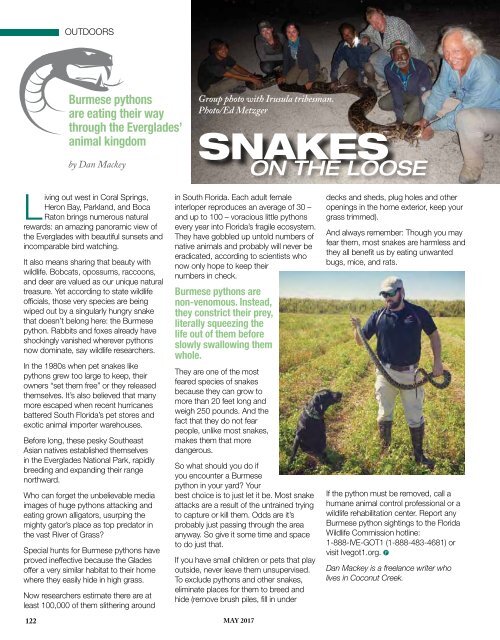May 2017
Create successful ePaper yourself
Turn your PDF publications into a flip-book with our unique Google optimized e-Paper software.
OUTDOORS<br />
Burmese pythons<br />
are eating their way<br />
through the Everglades’<br />
animal kingdom<br />
by Dan Mackey<br />
Group photo with Irusula tribesman.<br />
Photo/Ed Metzger<br />
SNAKES<br />
ON THE LOOSE<br />
by Mark Bohm<br />
Living out west in Coral Springs,<br />
Heron Bay, Parkland, and Boca<br />
Raton brings numerous natural<br />
rewards: an amazing panoramic view of<br />
the Everglades with beautiful sunsets and<br />
incomparable bird watching.<br />
It also means sharing that beauty with<br />
wildlife. Bobcats, opossums, raccoons,<br />
and deer are valued as our unique natural<br />
treasure. Yet according to state wildlife<br />
officials, those very species are being<br />
wiped out by a singularly hungry snake<br />
that doesn’t belong here: the Burmese<br />
python. Rabbits and foxes already have<br />
shockingly vanished wherever pythons<br />
now dominate, say wildlife researchers.<br />
In the 1980s when pet snakes like<br />
pythons grew too large to keep, their<br />
owners “set them free” or they released<br />
themselves. It’s also believed that many<br />
more escaped when recent hurricanes<br />
battered South Florida’s pet stores and<br />
exotic animal importer warehouses.<br />
Before long, these pesky Southeast<br />
Asian natives established themselves<br />
in the Everglades National Park, rapidly<br />
breeding and expanding their range<br />
northward.<br />
Who can forget the unbelievable media<br />
images of huge pythons attacking and<br />
eating grown alligators, usurping the<br />
mighty gator’s place as top predator in<br />
the vast River of Grass?<br />
Special hunts for Burmese pythons have<br />
proved ineffective because the Glades<br />
offer a very similar habitat to their home<br />
where they easily hide in high grass.<br />
Now researchers estimate there are at<br />
least 100,000 of them slithering around<br />
122<br />
in South Florida. Each adult female<br />
interloper reproduces an average of 30 –<br />
and up to 100 – voracious little pythons<br />
every year into Florida’s fragile ecosystem.<br />
They have gobbled up untold numbers of<br />
native animals and probably will never be<br />
eradicated, according to scientists who<br />
now only hope to keep their<br />
numbers in check.<br />
Burmese pythons are<br />
non-venomous. Instead,<br />
they constrict their prey,<br />
literally squeezing the<br />
life out of them before<br />
slowly swallowing them<br />
whole.<br />
They are one of the most<br />
feared species of snakes<br />
because they can grow to<br />
more than 20 feet long and<br />
weigh 250 pounds. And the<br />
fact that they do not fear<br />
people, unlike most snakes,<br />
makes them that more<br />
dangerous.<br />
So what should you do if<br />
you encounter a Burmese<br />
python in your yard? Your<br />
best choice is to just let it be. Most snake<br />
attacks are a result of the untrained trying<br />
to capture or kill them. Odds are it’s<br />
probably just passing through the area<br />
anyway. So give it some time and space<br />
to do just that.<br />
If you have small children or pets that play<br />
outside, never leave them unsupervised.<br />
To exclude pythons and other snakes,<br />
eliminate places for them to breed and<br />
hide (remove brush piles, fill in under<br />
MAY <strong>2017</strong><br />
decks and sheds, plug holes and other<br />
openings in the home exterior, keep your<br />
grass trimmed).<br />
And always remember: Though you may<br />
fear them, most snakes are harmless and<br />
they all benefit us by eating unwanted<br />
bugs, mice, and rats.<br />
If the python must be removed, call a<br />
humane animal control professional or a<br />
wildlife rehabilitation center. Report any<br />
Burmese python sightings to the Florida<br />
Wildlife Commission hotline:<br />
1-888-IVE-GOT1 (1-888-483-4681) or<br />
visit Ivegot1.org. P<br />
Dan Mackey is a freelance writer who<br />
lives in Coconut Creek.

















